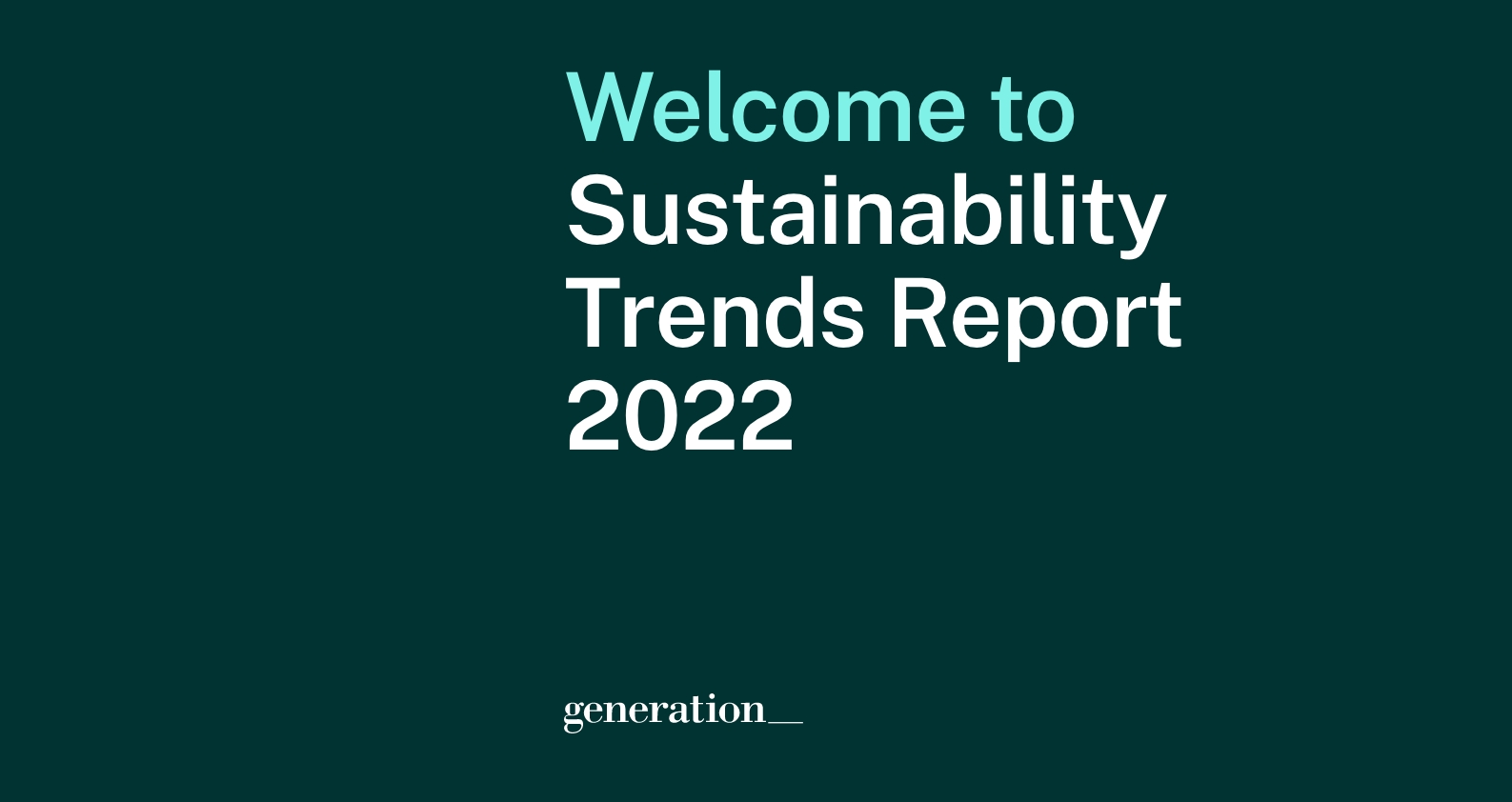Introduction
In April, Generation starts its twentieth year. We will celebrate our twentieth anniversary with you at our Global Client Conference in London on 19-20 March 2024. Please plan to join us.
With urgency, we expect to use the coming year to reflect on our next decade and consider how we can best do our part to contribute to a net-zero, prosperous, equitable, healthy and safe society.

Our founding principles are set in stone:
- We aspire to be outstanding investors.
- We are a pure-play sustainable investment manager – it is all we do, and all we will ever do.
- We share our experience and voice to advocate for the adoption of sustainable investing.
- We seek long-term client relationships by ensuring our interests are aligned fully with those of our clients.
- We are an independent, broadly owned and managed private partnership of values-aligned professionals.
We begin our letter with our thoughts on the current state of sustainable investing and follow with an update on the firm.
Current State of Sustainable Investing
Several encouraging developments over the past year have buoyed our hopes that the world is, at long last, getting serious about the net-zero and just transitions. In August of last year, the United States Congress passed the Inflation Reduction Act, and it was signed into law within days. The IRA is the largest step the United States has taken to tackle greenhouse gas emissions, and it has already provoked increased ambition from the European Union, setting off a worldwide race to the top that will speed the growth of renewable energy and other clean technologies. By 2030, if fully implemented, the new law will help cut American emissions by as much as 42 percent from their 2005 peak, roughly in line with the goals of the Paris Agreement. And it is of particular significance that the IRA has a focus on providing funding for environmental justice issues to the benefit of local communities. This is one of the most dramatic and important developments in the history of the climate crisis.
Moreover, voters in Australia chose a new government that is committed to meaningful action on reducing greenhouse gas emissions. And voters in Brazil elected a new President who promised to halt the destruction of the Amazon rainforest.
Yet other developments over this past year give us cause for worry. For example, many nations are continuing to provide massive subsidies for the expansion of fossil-fuel development. And in the asset management sphere, sustainable investing – which includes examining prospective holdings through the lens of environmental, social and governance factors – has come under political attack in the United States, with some governors and state attorneys general crusading against what they call “woke capitalism.”
This politically motivated backlash has been accompanied by a wave of scrutiny looking at sustainable investing through a critical lens. We welcome scrutiny; the marketplace is rife with greenwashing, or misleading claims. Indeed, some who describe themselves as “ESG investors” have simply engaged in a superficial box-checking exercise instead of a holistic approach that fully integrates sustainability factors into every part of the investment process.
However, the criticisms lack hard evidence that investing for sustainability is a failed concept. We must bear in mind what sustainable investing has achieved to date. When Generation started down this road 19 years ago, few other investors were considering sustainability factors. Rare was the corporation that had set targets to reduce its emissions of greenhouse gases, aspired to increase the diversity of its senior leadership team or considered its impact on nature. And many people in the financial markets believed that taking sustainability factors into account in investment decisions was inconsistent with fiduciary duty.
Today, thousands of corporations have set ambitious targets to cut their emissions and improve their diversity, and are pursuing those ambitions with zeal. They have done so under encouragement from investment professionals who have made consideration of sustainability factors a routine part of their work. And it has become abundantly clear that excluding sustainability issues is a dereliction of fiduciary duty.
We are well aware that the work we and other investors are doing will not be enough, by itself, to deliver a net-zero and just world. In aggregate, global action on climate remains far short of what is required to stay below a global temperature rise of 1.5°C, the aspirational goal of the Paris Agreement. Indeed, it is now obvious that we are collectively failing on achieving every single one of the 17 UN Sustainable Development Goals – especially Climate and Poverty/Inequality.1 While markets need to evolve in order to have genuine real-world impact, we must be clear that sustainable investing cannot change the world on its own. Such investing is necessary but far from sufficient to deliver the world we need. Investors cannot play the role that governments must play.
Yet when capitalism is focused on the long term and paired with policy that promotes positive environmental and social outcomes, it is the most powerful vehicle to enable a sustainable world for all. This means we need policy from government that creates the rules and incentives for a sustainable economy. We also need governments to step in where markets simply cannot succeed.
That is why there is an urgent need to adopt a model of economic growth that requires businesses to address the full costs of their activities, including greenhouse gas emissions and depletion of natural resources.
Expand what capital markets value
In our Senior Partner Letter 2022 we proposed three pillars of action for the investment community to accelerate the transformational change we need to limit global temperature rise to 1.5°C and ensure a just transition. What has occurred to us lately is that the most important step is to expand what capital markets value.2
It is becoming clear we will not attain a sustainable economy unless the stewards of capital consciously allocate the funds to help create it. Thinking in asset classes or financial risk parameters is not enough. The good news is a shift is underway. Investment managers have launched innovative strategies designed specifically to deliver sustainability outcomes – and asset owners who recognise the change needed in capital allocation are backing them.

Policy makers clearly see the need for a change in capital allocation. Sustainable Finance Disclosure Regulation (SFDR) is nothing if not a vehicle to help asset owners understand the extent to which they are allocating capital to a sustainable economy, nudge them towards it and ensure that asset managers are unable to greenwash the extent to which their strategies are aligned with a sustainable future.
When seeking to identify best practices, we as an industry and our clients must hold ourselves to account and compare our performance, not just on risk-adjusted returns but also impacts. Developing comparable data sets on impact and measurement and reporting norms should be the highest priority for sustainable investors. This includes the impact of our portfolio companies over time, as well as the contribution that we as investors make to improve those impacts.
Our Firm
Developing our senior leadership team3

We have said many times that this decade is the most important in our careers. Generation is well placed to fulfil our dual mission of delivering strong risk-adjusted investment results for our clients and promoting sustainable investing. Moreover, we expect to play a critical role in the net-zero and just transitions. As we consider the balance of the decade, it is also important to begin to plan for the next generation of our firm’s leadership.
In the spirit of the long-term development of our senior leadership team, we have asked Clara Barby, Tom Hodges and Nick Kukrika to join the Management Committee as of 1 January 2023.4 The committee is the senior governing body of the firm, and we will benefit from their insights. We expect the committee to evolve further in the coming years.
In addition, we are pleased to announce that Brian Dineen and Puja Jain are assuming new leadership roles in our Global Equity team as co-heads of the research process. We are also pleased to announce Tom as the co-head of the Long-term Equity strategy.
EDI
Our equity, diversity and inclusion work is a priority of our Management Committee supported by 21 EDI Champions across the firm. We remain focused on equity and fairness across all our people-related processes, including recruitment, remuneration and career progression.
There are 35 Partners at the firm and our gender and ethnic background representation data at leadership levels is as follows:
Gender
| Men | Women | |
| Partners | 63% | 37% |
|
Members of leadership committees |
55% | 45% |
Ethnic background5
| White | Mixed/multiple ethnic groups | Asian | Black | Other ethnic groups | |
| Partners | 70% | 3% | 15% | 9% | 3% |
| Members of leadership committees | 80% | 0% | 10% | 10% | 0% |
Impact initiatives
As a small firm we must focus, motivate and collaborate with others. We pursued the below impact initiatives in the past year:
The Sustainability Trends Report: Drawing on numerous sources, we published our sixth annual STR in 2022 and hope it will become the ‘go-to’ resource for those seeking information on sustainability developments. Our aim is to aggregate and share insights that governments, businesses and investors can use to ensure a net-zero, prosperous, equitable, healthy and safe society.
Sustainability Insights: We launched our Insights series in 2019 to share lessons drawn from our investment work in the form of publicly available research papers. In 2022, we published seven papers covering the following topics: Fossil Fuels, the Economy and Instability; a three-part series on the question ‘Is a Sustainable World an Inflationary World?’; China’s Progress Towards a Net-Zero Future; The Harmonisation of Sustainability Standards for Investors; and Deforestation.
Measuring portfolio alignment: Throughout 2022, Generation led the workstream within the Glasgow Financial Alliance for Net Zero (GFANZ) on how to measure the alignment of financial portfolios with the goals of the Paris Agreement. The workstream report published on the eve of COP27 builds on the work of the Portfolio Alignment Team that Generation led in 2020-2021 and seeks to drive enhancement, convergence and adoption of portfolio alignment measurement by GFANZ members.
Investor engagement: Generation became a founding signatory to the Finance Sector Deforestation Action (FSDA) group at COP26 in Glasgow. Over the course of 2022, Generation worked with other founding investor signatories to develop a set of investor expectations to guide companies in their efforts to combat the problem of deforestation. Tackling deforestation related to risky agricultural commodities represents a key opportunity and imperative for the financial sector toward meeting net-zero commitments. This will remain a priority for Generation over the coming years.
The work on deforestation complements existing engagement work on sustainability issues across all our strategies, focusing particularly on climate change and diversity. Indeed, in the Global Equity strategy, we have started to operate a policy generally to vote against the re-election of chairs of companies that are not participating in the Science Based Targets initiative.
Climate TRACE: Climate TRACE is a non-profit coalition of artificial intelligence (AI) based tech companies, non-government organisations and universities that are harnessing satellite imagery and other forms of remote sensing, artificial intelligence and collective data science expertise to track human-caused greenhouse gas emissions with unprecedented detail and speed. Climate TRACE’s emissions inventory is the world’s first comprehensive accounting of greenhouse gas emissions based primarily on direct, independent observation. The Partners of Generation have provided significant funding for Climate TRACE. At COP27 the Climate TRACE coalition released the most detailed facility-level global inventory of greenhouse gas emissions to date.

The nearly 80,000 individual sites – including specific power plants, steel mills, urban road networks, and oil and gas fields – represent the top known sources of emissions in their respective sectors, including power generation, oil and gas production and refining, shipping, aviation, mining, waste, agriculture, road transportation, and the production of steel, cement and aluminium. This new information – sourced independently and primarily based on direct observations of activity rather than self-reported data – provides the detail and timeliness needed to inform and accelerate decarbonisation decisions worldwide.
Generation Foundation
Since its founding alongside Generation in 2004, the Generation Foundation has conducted research and made grants to accelerate the transition to a more sustainable economic system. The Foundation made approximately GBP 10 million in new strategic grants in 2022 under the dual pillars of its strategy: climate and fairness. New work included a multi-year partnership with the World Benchmarking Alliance to build a gender benchmark that includes metrics on the care economy; and a partnership with InfluenceMap to make public where lobbying by industry groups is stalling climate action and innovation.
The Foundation continued its work on A Legal Framework for Impact, its multi-year project on fiduciary duties. In 2021 the project commissioned law firm Freshfields Bruckhaus Deringer to produce a report of the same name, which found that mainstream investors will generally need to consider the impact of key sustainability factors on their financial goals and take appropriate steps as a result. However, most investors are still unaware of the extent of those duties. The project is focused now on dual goals of supporting investors in complying with their obligations and promoting policy reform to overcome real and perceived barriers to sustainable investment in key jurisdictions.
Generation’s direct environmental impact
Our firm’s operational environmental impact is driven primarily by the energy consumption of our offices, business travel, and procurement of goods and services. We aim to minimise our carbon footprint and use of environmental resources through our sourcing decisions and by promoting behavioural changes amongst employees, suppliers and other stakeholders. We also operate an extensive carbon compensation programme.
Our offices: Generation has designed its offices to minimise the environmental impact of its operations. Both offices are located centrally and are well served by public transport facilities. In London, our office at 20 Air Street achieved the Excellent rating by BREEAM (Building Research Establishment Environmental Assessment Method). Similarly, our San Francisco office is located in a building that has been re-certified as Platinum for the Leadership in Energy and Environmental Design (LEED) standard that applies to the operational efficiency of existing builds. Finally, Generation has retained its B Corporation certification with a B Impact Assessment score of 96.5.6 The B Corporation status indicates that a company has been verified to meet high standards of social and environmental performance, transparency and accountability.

Energy procurement: The building management companies that oversee Generation’s offices are served by green energy through mechanisms such as power purchase agreements and green tariffs. The contracts in place cover 100% of the quantity of energy used by Generation. We recognise that differences between the timing of the renewable power generation and the timing of our energy consumption make claims to be using ‘100% renewable energy’ problematic, and we support further work to create more robust standards, and mechanisms, for the elimination of Scope 2 emissions.
Suppliers, training and monitoring: We assess our suppliers against an onboarding framework, which includes questions relating to their ESG practices, and have been working with consultants to improve our data on supply chain emissions, as well as our understanding of the maturity of our suppliers’ approaches to the reduction of carbon emissions. For physical supplies, we aim to contract with local providers where possible, or those that already service our building with the aim of reducing travel and consolidating deliveries.
To Conclude
“Climate change is a threat to human well-being and planetary health. There is a rapidly closing window of opportunity to secure a liveable and sustainable future for all … The choices and actions implemented in this decade will have impacts now and for thousands of years.” – Intergovernmental Panel on Climate Change Sixth Assessment Report, March 2023
We are often asked: are we optimistic about the future? Rather than choose between optimism and pessimism, we prefer to say we are determined. We are determined to create the sustainable future we want, and to ask hard questions of others and ourselves about how the financial system (as actors in it) can address the urgency of the net-zero and just transitions.
In our 2021 Senior Partner Letter we committed to work with others on five societal goals. Two years on, we are as committed as ever to advocating for a global price on carbon and the other objectives. We also recognise that we must be clear on what our aspirations are for society, how we are contributing and what we seek to achieve within the financial system. We will share with you additional thinking on our aspirations in the coming year.
As we start our twentieth year, we are committed to sharpening our focus on the financial system in which we operate and the rules that lead us toward a sustainable future. We are especially committed to providing specific and illustrative examples of sustainable companies. Finally, we will explore with more precision how to consider impact within a traditional risk and return framework. We welcome your thoughts on these important questions and will share our thinking with you at our Global Client Conference.
David Blood, Senior Partner, on behalf of the Partners and employees of Generation Investment Management, Just Climate and the Generation Foundation
- Climate Action 13, Nature (Sustainable use of ecosystems 14/15), and Inequality 10. Progress Chart on SDGs https://unstats.un.org/sdgs/report/2022/Progress-Chart-2022.pdf
- Oliver Wendell Holmes, Jr. was said to greet friends after a long absence with “what has occurred to you lately?”
- Please also refer to our recent updates on our investment strategies.
- Subject to Financial Conduct Authority approval, the Management Committee membership as at 1 January 2023 is Al Gore, David Blood, Lisa Anderson, Clara Barby, Mark Ferguson, Esther Gilmore, Tom Hodges, Nick Kukrika, Miguel Nogales and Lila Preston; with Alex Marshall of counsel.
- Consistent with UK Office of National Statistics ethnic group breakdowns.
- Certified B Corporations are leaders in the global movement for an inclusive, equitable and regenerative economy. They meet high standards on factors from employee benefits and charitable giving to supply chain practices and input materials. Source: B Lab.





